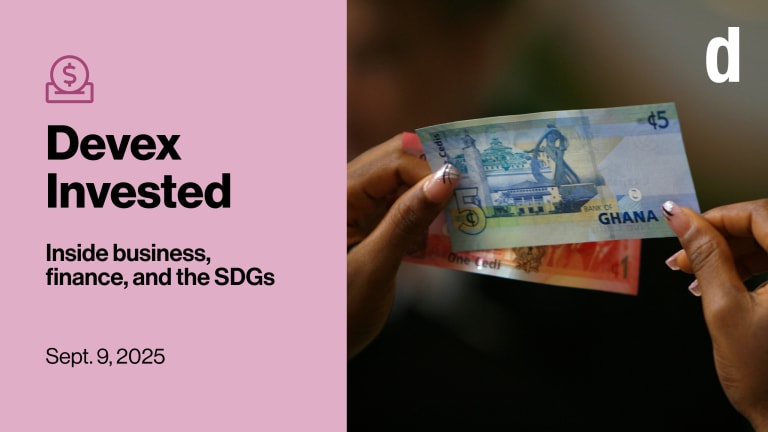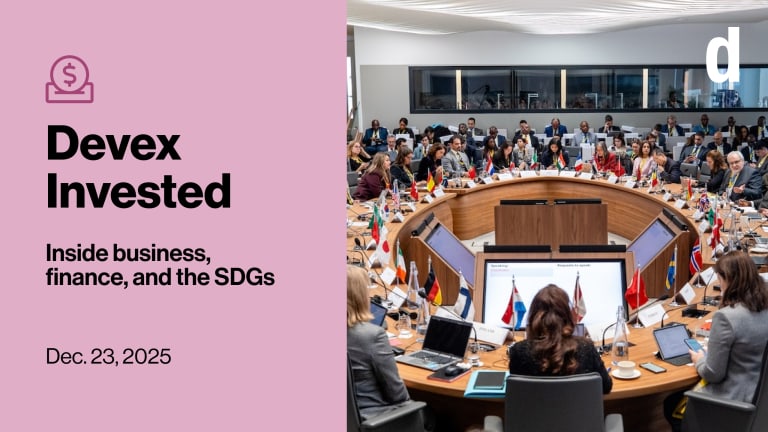
It’s been a less-than-stellar year so far for the Dutch development bank, FMO: Between the war in Ukraine and fallout from the COVID-19 pandemic, the lender is behind on some of its key goals, including its investments aimed at reducing inequalities — a measure it rolled out to align with the United Nations’ Sustainable Development Goal 10.
This is a preview of Devex Invested
Sign up to this weekly newsletter inside business, finance, and the SDGs, in your inbox every Tuesday.
Those events have hurt the balance sheet and investment targets of an institution responsible for why the Netherlands “punches above its weight in terms of driving development internationally,” as one expert put it.
Can FMO step up during the rest of 2022? Will the Ukraine-associated losses reduce its risk appetite? Here’s what you need to know:
• FMO is off track to reach its target of just over $1 billion in new “Reducing Inequality, or RI,” investments this year, Andrew Green reports for Devex. It is still on track to meet its green target, with some €289 million investments thus far this year.
• There has also been a roughly $158 million impact on the bank’s private equity and loan portfolios in Ukraine, Japp Reinking, FMO’s director of private equity, tells Andrew. The overall profits were down sharply compared to the first half of 2021, but the banks ratio of capital to assets, which measures a bank's ability to withstand a crisis, remained virtually unchanged.
• A good chunk of the RI investments go through financial institutions, or FIs — which have been more cautious amid the global crises and haven’t needed as much funding from FMO as the lender anticipated.
• As part of an effort to play catchup, the bank plans to step up its lending to FIs in the second half of the year, with a focus on those willing to start or expand lending to small- and medium-sized enterprises, along with those that serve women, youth, migrants, and rural entrepreneurs — particularly in lower-income countries, says Marnix Monsfort, FMO’s director of financial institutions.
• The reducing inequality portfolio also focuses on agriculture investments and energy investments, and the former is getting more attention from FMO. The bank aims to ramp up investments to alleviate the global food security crisis, both through deals that tackle improving food production and taking on risk in countries requiring basic commodities, FMO says.
Read more: Ukraine war, pandemic derail FMO in its ‘Reducing Inequalities’ measure
Mastering financial inclusion
When the Mastercard Center for Inclusive Growth — an initiative separate from the independent Mastercard Foundation — set out to use its knowledge to help garment workers in Egypt a few years ago, one of the most impactful things it did was to help digitize payroll for the mostly female workforce. Many other companies have followed suit after that first pilot, reports my colleague David Ainsworth.
“We saw very quickly that the notion of having a digitized payroll, having a bank account, having a way to purchase that is safe and secure, helps them not only their trust in the system, but their ability to save and earn,” says Shamina Singh, the center’s founder and president.
Read: How Mastercard’s corporate philanthropy work spurs financial inclusion (Pro)
+ A Devex Pro membership offers deeper analysis of the development sector, exclusive digital events, and access to the world’s largest global development job board. Try it out today by signing up to our 15-day free trial.
Mind the gap
The International Monetary Fund will “apply a gender lens” to all of its core work under a new, first-of-its-kind policy, my colleague Shabtai Gold writes.
The justification: IMF argues that economic disparities between men and women are “macro-critical” and affect countries’ economic growth and well-being. That direct tie to member countries’ economies makes these gender disparities part of the fund’s remit and allows it to put money behind addressing the gaps.
Read: IMF to apply ‘gender lens’ to all its work under first gender policy
Impact incentive
Upcoming events
ONLINE
Devex @ UNGA 77
Sept. 21-22
ONLINE | IN-PERSON
Global Week to #Act4SDGs
Sept. 16-25
NEW YORK CITY
Sustainable Development Impact Meetings
Sept. 19-23
TURKEY
2022 EBRD TFP Trade Finance Forum
Sept. 21-22
PHILIPPINES
55th ADB Annual Meeting of the Board of Governors
Sept. 26-30
There’s a lot of talk about the need to expand financial services for women and close financial inclusion gaps — see above! — but many of the companies or investments targeting the fintech space aren’t designed with that in mind.
Enter the Impact-Linked Fund for Gender Inclusive Fintech, which aims to provide technical assistance but also incentivize impact to better achieve “gender-transformative outcomes for financial inclusion.” The fund — managed by a consortium including Dutch foundation Impact-Linked Finance Fund, Roots of Impact and iGravity, with Bamboo Capital Partners and Women’s World Banking Asset Management as investors — is structured to provide incentives to the companies that achieve gender outcomes through a number of instruments, including impact-linked loans where rates might vary based on impact, impact-linked revenue share agreements, or through social impact incentives.
Launched last week, the fund has already secured $13.4 million from the Swiss Agency for Development and Cooperation and the Austrian Development Agency, and aims to raise a total of $21 million.
What we’re reading
Why Ghana went from hero to zero for investors. [Bloomberg]
Nasdaq’s growing ESG business is under threat – from Nasdaq. [Financial Times]
How water scarcity threatens the global economy. [Barron’s]









